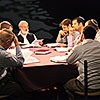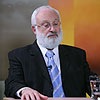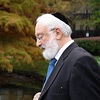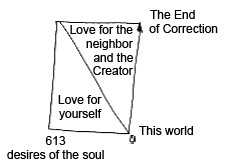 Before we read The Book of Zohar, we have to be aimed at the goal. All the previous life cycles we had gone through were developing us in the material plane, where we were closed off inside ourselves. We only aspired to increase our internal will to enjoy, trying to fulfill it as much as possible. We experienced a connection with others only in order to use them for self-gratification.
Before we read The Book of Zohar, we have to be aimed at the goal. All the previous life cycles we had gone through were developing us in the material plane, where we were closed off inside ourselves. We only aspired to increase our internal will to enjoy, trying to fulfill it as much as possible. We experienced a connection with others only in order to use them for self-gratification.
This developmental process eventually brought us to a point where we have exhausted all the possibilities of being fulfilled. This caused a feeling of disillusionment in our attempts to feel perfection or pleasure in this manner. We know we cannot attain a perfect, eternal life, even though our ever-developing desire hoped for this. We feel that there is nothing left for us to do with this aspiration for ceaseless self-gratification.
But suddenly, together with the disappointment from this life, we reveal the point in the heart – a desire to find the answer to the question of how it is possible to attain that sensation of a perfect, eternal life. This desire pulls us outward instead of inward, away from the place where we had always tried to find fulfillment and perfection in life.
“Outward” means changing your attitude to other people, although you will only realize this much later. You always aspired to use your neighbor in order to fulfill yourself, but now you have to understand that there are no other opportunities besides changing your attitude to your neighbor from reception to bestowal.
By bestowing to your neighbor, you acquire a new desire – the desire of others, who are actually inside of you. You will discover that their desires are actually yours; they are the desires of your soul. If you acquire the right connection with them, then all these desires will become yours. They will be your vessel of perception (your Kli).
But is this really possible? Indeed, it would never be possible if we tried to achieve this on our own. However, this is what we have to accomplish in order to acquire the sense to perceive the spiritual world.
The spiritual space lies beyond your body. It is your attitude to that which is “outside of you.” Right now it seems non-existent, unreal, and unattainable. You reject these desires, which are “outside of you.” You cannot imagine that they belong to you, and therefore you can’t imagine what the spiritual world is. You can’t even surmise that when you attain these desires, within them you will reveal a fulfillment called “the Creator.” In the meantime, however, they seem non-existent or empty to you.
This blindness keeps you from feeling that the spiritual world is comprised of those “foreign” desires which are outside of you. Right now you perceive your attitude of reception to them as “hell.” If your attitude to them changes to bestowal, then you will feel that you are in “heaven” because you will feel everything that fulfills them – and you will desire for all of it to fulfill them as well. In other words, you create hell or heaven yourself, “outside” of you.
Therefore, in the beginning of your spiritual development, the Creator brings you to a Kabbalistic group. However, you don’t see it as being great or spiritual. It is written, “Every person judges others to the extent of his own faults.” Baal HaSulam explains in the article “The Creator’s Concealment and Revelation” that your attitude to others determines what you will find in them: emptiness or fulfillment, this world or the spiritual world, and even the World of Infinity.
Therefore, you have to convince yourself that spirituality lies in your attitude to everything outside of you, which is beyond the limits of your corporeal desires. It is written, “The Shechina dwells outside of man” (beyond man’s skin or surface, which refers to one’s animate desire on the level of Aviut Dalet – the skin of an animal).
A person has to accomplish this inner change using help from outside – from the group, which will give him the right sensation, understanding, and confidence. The group will convince him of this because the environment is capable of convincing us of anything. This is our primary task. This is why we hold friends’ gatherings, meetings, congresses, and all sorts of events; it’s to enable every person to be influenced by the right environment, which will convince us that spirituality is attained precisely by changing our attitude to others.
The entire study of the science of Kabbalah is intended to help us understand this, to be convinced of it, and to reveal the right attitude of bestowal, even love, for our neighbor. Through this attitude we will also reveal our true selves – our soul, or more exactly, our common soul, Malchut of Infinity. We will reveal the Shechina and the Creator ruling over everything together, as it is written, “He and His Name are One.”
This is the intention we should have when reading The Book of Zohar.
Filed under: Daily Kabbalah Lesson, Zohar - No Comments →
 Rabash’s article, "The Purpose of the Association:" We have met today to establish an association of those interested in following the path and method of the author of the “Sulam” (Kabbalist Rabbi Yehuda Ashlag), the path of ascension from the level of an animal to the level of man.
Rabash’s article, "The Purpose of the Association:" We have met today to establish an association of those interested in following the path and method of the author of the “Sulam” (Kabbalist Rabbi Yehuda Ashlag), the path of ascension from the level of an animal to the level of man.

 How can we achieve eternity and perfection? It’s achieved according to the law of equivalence of form. If the
How can we achieve eternity and perfection? It’s achieved according to the law of equivalence of form. If the 






 We do everything for our own good, because our nature is the will to enjoy. This is why we always ask, “Why do I need this? What kind of profit will I make from this? Is it worth it for me to make the effort?”
We do everything for our own good, because our nature is the will to enjoy. This is why we always ask, “Why do I need this? What kind of profit will I make from this? Is it worth it for me to make the effort?”




